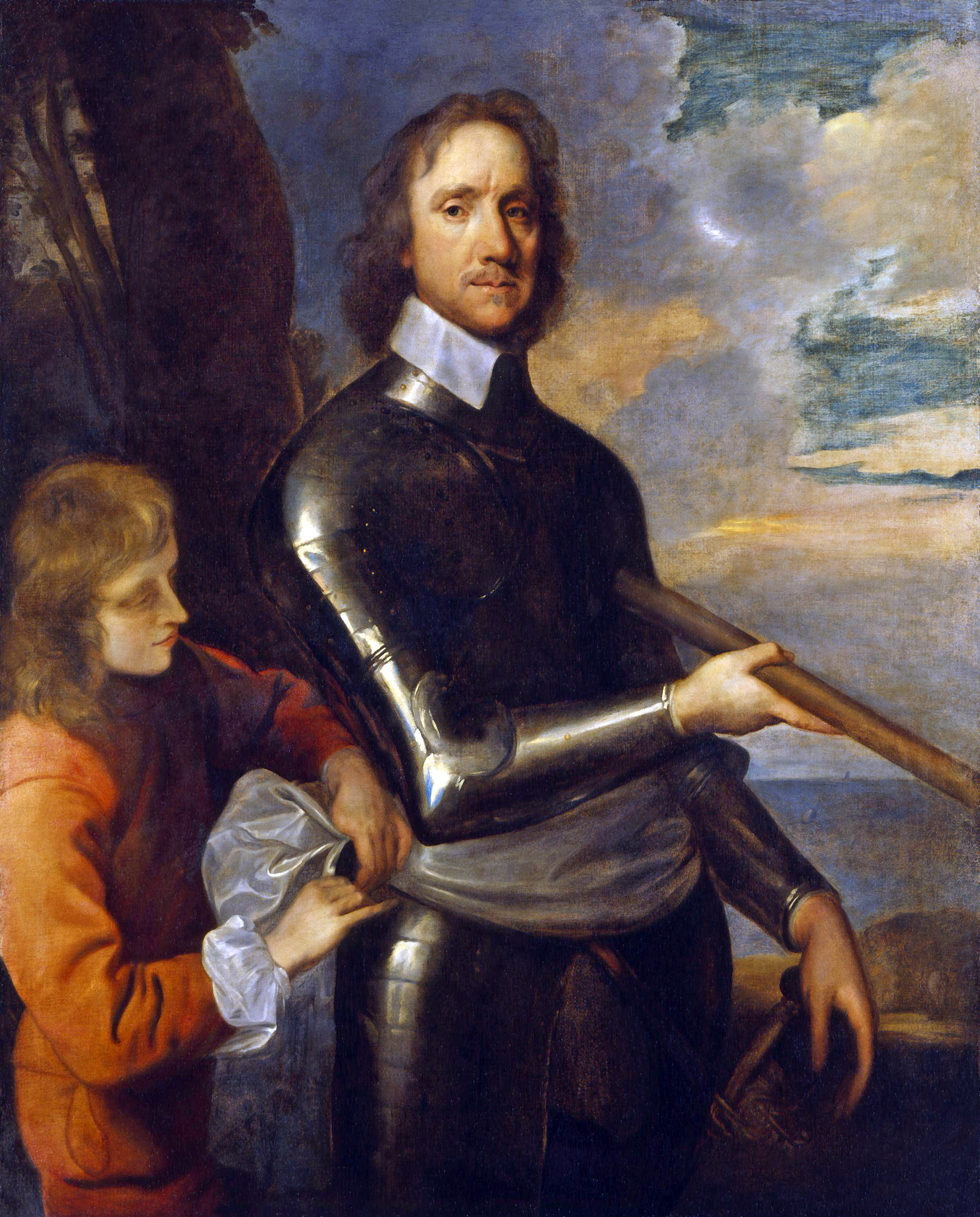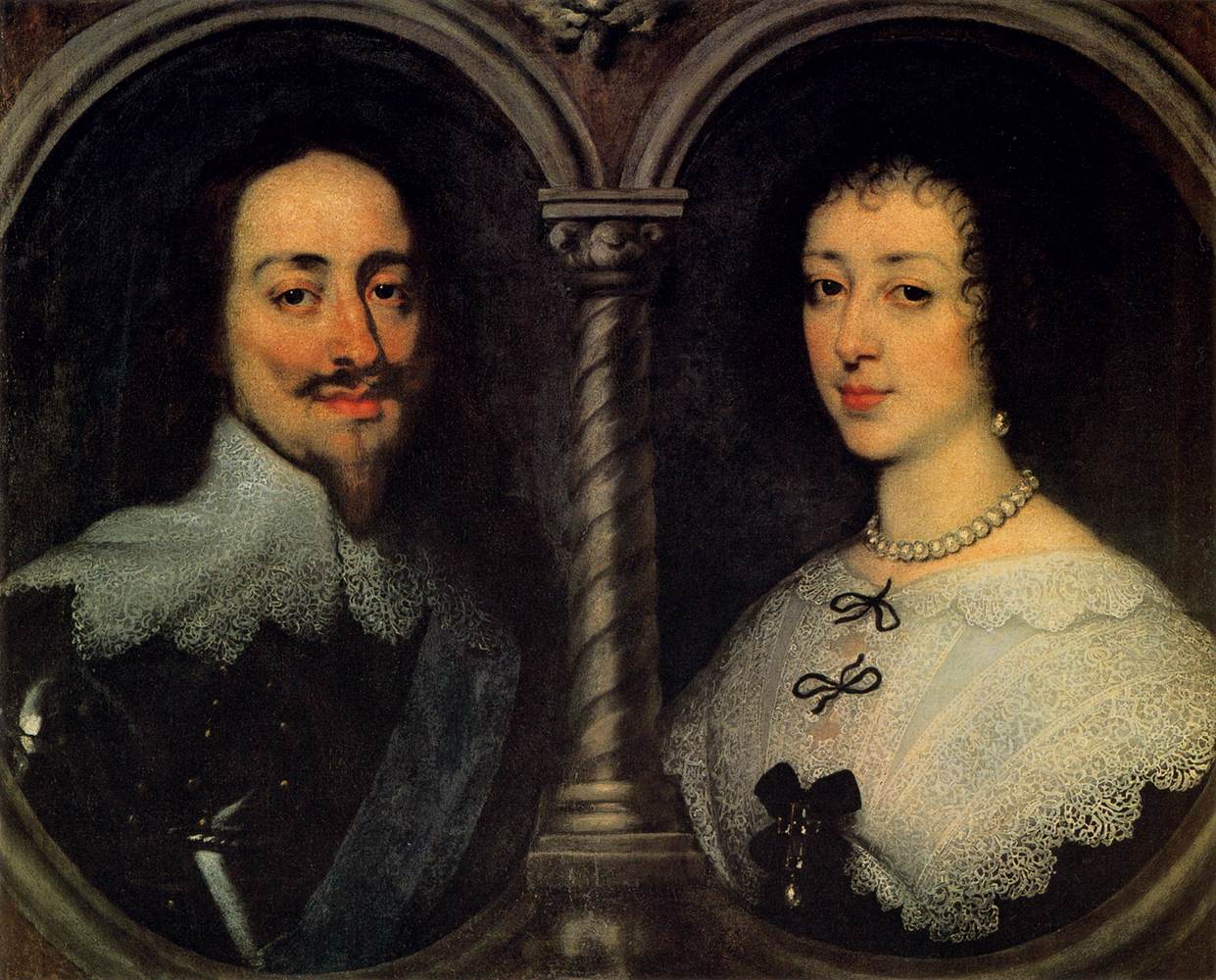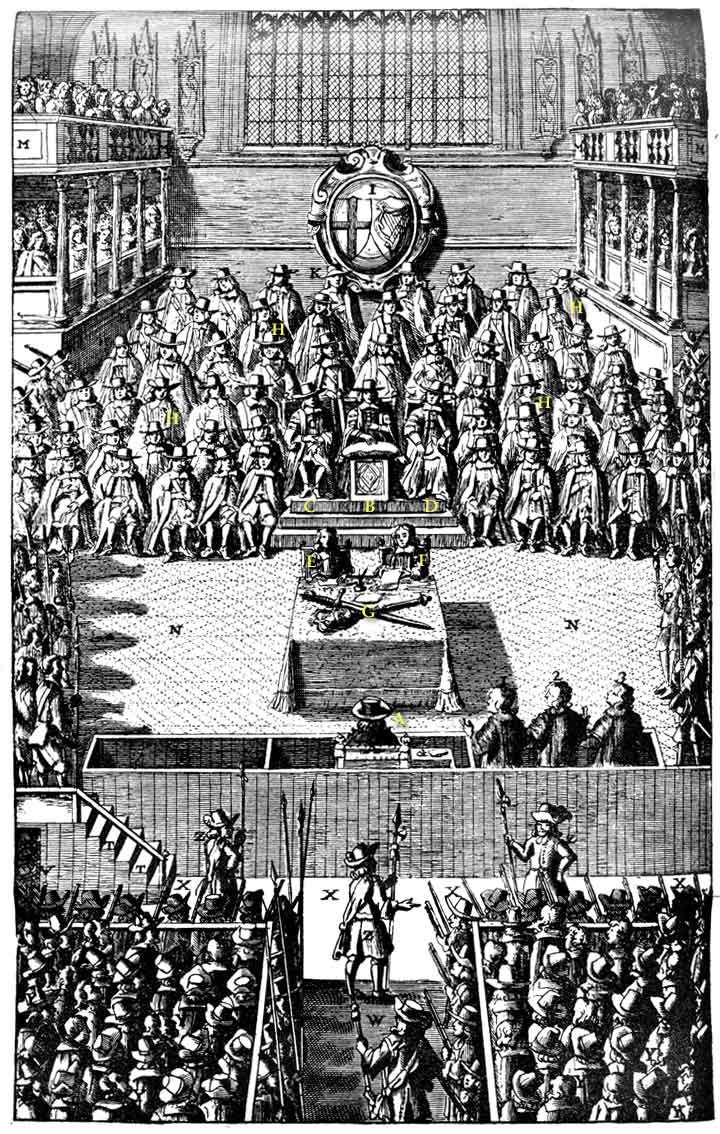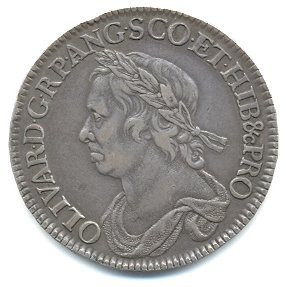.

An Horatian Ode upon Cromwel's Return from Ireland
The forward Youth that would appear
Must now forsake his Muses dear,
..Nor in the Shadows sing
..His Numbers languishing.
'Tis time to leave the Books in dust,
And oyl th'unused Armours rust:
..Removing from the Wall
..The Corslet of the Hall.

So restless Cromwel could not cease
In the inglorious Arts of Peace,
..But through adventurous War
..Urgèd his active Star.

Battle of Marston Moor, 2 July 1644: John Barker, before 1904 (image by Mathiasrex, 2008)
And, like the three-fork'd Lightning, first
Breaking the Clouds where it was nurst,
..Did thorough his own Side
..His fiery way divide.
For 'tis all one to Courage high
The Emulous or Enemy;
..And with such to inclose
..Is more than to oppose.

Then burning through the Air he went,
And Pallaces and Temples rent:
..And Caesars head at last
..Did through his Laurels blast.

Cromwell fighting at the Battle of Worcester, 1651: William Miller, 1810 (image by JLorenz1, 2007)
'Tis Madness to resist or blame
The force of angry Heavens flame:
..And, if we would speak true,
Who, from his private Gardens, where
He liv'd reserved and austere,
..As if his highest plot
..To plant the Bergamot,
Could by industrious Valour climbe
To ruine the great Work of Time,
..And cast the Kingdome old
..Into another Mold.

Charles I in the robes of the Order of the Garter: Sir Anthony van Dyck, 1636 (image by Lord Horatio Nelson, 2008)
Though Justice against Fate complain,
And plead the antient Rights in vain:
..But those do hold or break

The New Model Army Souldier's Catechisme, rules, regulations and drill procedures, First English Civil War: photo by Gene.arboit, 2006
Nature that hateth emptiness,
Allows of penetration less:
..And therefore must make room.
..Where greater Spirits come.
Site of the Battle of Naseby (14 June 1645), Naseby, Northamptonshire: photo by Stavros1, 2007
What Field of all the Civil Wars,
Where his were not the deepest Scars?
..And Hampton shows what part
..He had of wiser Art.

Charles I of England and Henrietta of France: Sir Anthony van Dyck, 1636 (Galleria Palatina/Palazzo Pitti, Florence)
Where, twining subtile fears with hope,
He wove a Net of such a scope,
..That Charles himself might chase
..To Caresbrooks narrow case.

Trial before Parliament of King Charles I, 1649: artist unknown, from J. Nelson: Nelson's Record of the Trial of Charles I, 1683 (image by Btphelps, 2008)
That thence the Royal Actor born
The Tragick Scaffold might adorn
..While round the armed Bands
..Did clap their bloody hands.
Charles I at his Trial before Parliament, 1649: Edward Bower, 1649 (image by Thomas Gun, 2009)
He nothing common did or mean
Upon that memorable Scene:
..But with his keener Eye
..The Axes edge did try:
Beheading of Charles I, 1649: author unknown (German), from D. Williamson: The Kings and Queens of England, 1998 (image by Giacomo, 2009)
Nor call'd the Gods with vulgar spight
To vindicate his helpless Right,
..But bow'd his comely Head,
..Down as upon a Bed.
King Charles the Martyr (Christomimetes): anonymous, late 17th century (National Portrait Gallery; image by Thomas Gun, 2009)
This was that memorable Hour
Which first assur'd the forced Pow'r.
..So when they did design
..The Capitols first Line,
A bleeding Head where they begun,
Did fright the Architects to run;
..And yet in that the State
..Foresaw it's happy Fate.
And now the Irish are asham'd
To see themselves in one Year tam'd:
..So much one Man can do,
..That does both act and know.
They can affirm his Praises best,
And have, though overcome, confest
..How good he is, how just,
..And fit for highest Trust:
Nor yet grown stiffer with Command,
But still in the Republick's hand:
..How fit he is to sway
..That can so well obey.
He to the Commons Feet presents
A Kingdome, for his first years rents:
..And, what he may, forbears
..His Fame to make it theirs:
And has his Sword and Spoyls ungirt,
To lay them at the Publick's skirt.
..So when the Falcon high
..Falls heavy from the Sky,
She, having kill'd no more does search,
But on the next green Bow to pearch;
..Where, when he first does lure,
..The Falckner has her sure.

British half-crown coin, 1658, bearing head of Oliver Cromwell in classical style; inscription: OLIVAR[IVS]·D[EI]·G[RATIA]·R[
What may not then our Isle presume
While Victory his Crest does plume!
..What may not others fear
..If thus he crown each Year!
A Caesar he ere long to Gaul,
To Italy an Hannibal,
..And to all States not free
..Shall Clymacterick be.
Cromwell at Dunbar, 3 September 1650: Andrew Carrick Gow, c. 1866
The Pict no shelter now shall find
Within his party-colour'd Mind;
..But from this Valour sad
..Shrink underneath the Plad:
Happy if in the tufted brake
The English Hunter him mistake;
..Nor lay his Hounds in near
..The Caledonian Deer.
But thou the Wars and Fortunes Son
March indefatigably on;
..And for the last effect
..Still keep thy Sword erect:
Besides the Force it has to fright
The Spirits of the shady Night,
..The same Arts that did gain
..A Pow'r must it maintain.
Oliver Cromwell's death mask, Warwick Castle: photo by Chris Nyborg, 2006










12 comments:
Here's a classic exposition of some of this great poem's multiple ambiguities.
Very nice, Tom. One of my favourite poems; where is our Republic now?
Tom, it's deeply moving (and also hilarious) that I've been teaching Brit Lit in San Diego these days and occasionally see poems -- on my periodic visits to your blog -- that I've just talked about in class. Marvell was an interesting case indeed, a real survivor -- although I tend to, finally, like the more metaphysical lines myself, e.g.,
The mind, that ocean where each kind
Does straight its own resemblance find
-- you have to admit that those are the best lines Charles I ever got (and probably more than he deserved). There probably is a point where "multiple ambiguities" become politically queasy, but Andrew walked that line pretty carefully . . .
"The Definition of Love" is also pretty good (he said, going to his bookshelves) . . .
Therefore the Love which us doth bind,
But Fate so enviously debars,
Is the conjunction of the mind,
And opposition of the stars.
(sigh)
Was driving down 580 last weekend, on my way back to Oakland Airport after a conference, and passed the Albany exit . . . almost got off to say hello . . .
Tom,
Thanks for this, great to read this great poem complete w/ illustrations, never before seen in such a clear light. And how timely too, given what's going on "over there" (gives this one pause, whose "highest plot, to plant the bergamot"). . . .
3.27
grey whiteness of clouds above shadowed
ridge, golden-crowned sparrow’s oh dear
in foreground, wave sounding in channel
position first described in
a letter, inaccurate
that is, itself alone being
thinking, is in fact
grey white clouds reflected in channel,
wingspan of gull flapping toward ridge
There are these several additional Marvells in the BTP archive:
Andrew Marvell: Damon the Mower
Andrew Marvell: By the River Wharfe
Andrew Marvell: The Definition of Love
It should be plain that the course of history, of late, has given ample opportunity to consider the meaning of the terms like dictator, tyrant, rebel, regime change and and coup d'état.
The complexities of these matters remains well beyond the talents of any poets now writing, at least in English.
Marvell's courage in tackling the most momentous political matters of his lifetime, literally matters of life and death, is truly wondrous; and the nuanced skill of his indications of misgivings, equivocations, and doubts, merely confirms the integrity of the effort.
The best commentary on this poem I've read is Barbara Everett's "The Shooting of the Bears".
"The Ode," Everett writes, "is certainly a brilliant political poem; but the poet has extended his politics as far back as to the Rome of Lucan and Horace, and then further back still, to a time when life seems to consist only of the hunt, and of the garden. And to take it that far is to take it almost out of history."
I have thought for a long while upon Marvell's sympathies and dispositions regarding the matter addressed in this poem. Private conclusions have been arrived at; and proven premature by further ruminations, years down the line. He is the most reserved and secretive of writers, in many ways; playing his cards so close is, to my mind, one of his great strengths.
But in later years, after the restoration of the Monarchy, when he was serving as a member of Parliament for Hull, he wrote a satire in which he left some remarks that give pause. He was looking back upon the subject of his Ode, the time of the Civil Wars. Few have noted these remarks, but they tell us much.
"I think the Cause was too good to have been fought for. Men ought to have trusted God; they ought and might have trusted the King with the whole matter... For men may spare their pains where Nature is at work, and the world will not go the faster for their driving. Even as his Majesties present happy Restoration did it self, so all things else happen in their best and proper time, without any need of our officiousness."
-- The Rehearsal Transposed: Second Part (1673)
Tom, first I read the Brooks-Warren article (was that your college textbook, by some chance?), and agreed completely that "the temptation is strong to see the poem merely as a historical document" -- still, there's a bit too much special pleading for new criticism there for me, in both their tone and their content.
The lines from Marvell's late satire, though, are thoroughly and completely Royalist, identifying the king with the Divine Right he thought he was representing. Hard to believe that the cautious Marvell could really "believe" that (for one thing, Milton would have slapped him around!), but people undergo all kinds of deathbed conversions.
The main point, though, is that history and politics are easy to dismiss from poetic practice, and perhaps always have been. So I appreciate you saying that tackling, in some way, the most momentous political events of one's lifetime is a worthy poetic calling.
If, in my previous post, I seemed to suggest that the more metaphysical lines of "A Definition of Love," with their meditations on Love and Fate, were somehow "weightier" than the political concerns of this poem, that was incorrect: politics is metaphysics, and vice versa. The Everett essay seems especially interesting in that context, and I'll look it up.
Hey, I even like "To His Coy Mistress"!
Less scholarly than many/most here, I first read An Horatian Ode some months ago based on a previous BTP post. We flew from the east coast to Los Angeles today and I spent a lot of productive time reading and re-reading the poem and the Brooks-Warren essay on the plane while ignoring/avoiding other work. I enjoyed the additional comments that have appeared since our arrival and will check out the Everett commentary also. It was a good feeling carrying around the poem, my thoughts about it and the thoughts of more knowledgeable people today while showing my daughter that the Pacific Ocean was real and not just a large patch of blue on the map.
I forgot to mention the images included here, which are astonishing and add immeasurably (I know that's saying a lot) to the basic experience of reading the poem, as well as to my knowledge and understanding of the underlying history.
Thanks, Curtis. Does that "we" mean that all three of you are in LA right now? If so, I hope you have umbrellas. Up here it continues to rain in volume, at this moment.
New critics, old critics... back in the geological epoch when actual hard scholarship still existed, one had to know something before signing up to be a critic, whether new (American), old (British), or other.
Since then, the history of poetry has been re-written for the mutual convenience of a few tin-eared academic pseudo-poet schmoozers who resent history and wouldn't know a poem if it came up and slapped them.
But... whatever.
I do love the idea of Milton slapping something or someone around.
"Hide the kittens, here comes Mr. Milton!"
On dark rainy nights the ghosts of the past return and shadowy spirits bring affright, which is why Cromwell insisted on seeing the corpse of the King he had beheaded. Cromwell may have been in some respects without conscience, but being a man of his age, he was not beyond superstition, and destroying the Kingdom Old is not something one does every day of the week.
The one part of the poem that always catches in the throat is the bit where the Irish, whom he has massacred, "profess" the divine right of the virtuous Son of Wars and Fortune to slaughter, pillage, and club them to death.
When it became known to my Irish grandmother that I was about to sail off to England to University, she shed a tear.
"Are there not universities in other places where you might go, then?"
Out of respect to her memory and to the truth of history it should not go unnoted that, whatever Marvell may have known of it (probably almost nothing), the Irish campaign remains a black mark on Cromwell's career. In the Walker portrait at the top of the post we see a cool, calculating man in whose way one would not wish to get. The Irish made the mistake of getting in his way, and when his blood was up... not so cool, then, was our Ollie. But of course the full inventory of his war crimes will never be toted up -- it's been estimated that the tally came to perhaps half the population of the Emerald Isle.
In some quarters it is still not possible, down to this day, to sustain civil discussion of Cromwell's genocidal ethnic/religious cleansing campaign in Ireland. Those old scores may go unsettled forever.
Hi again and yes, we're all here, catching up with old friends as well as taking care of some business in a relaxed sort of way. The weather was apparently terrible last week, as it was up north, but now and for the rest of the week it's supposed to be really pleasant, which is very uplifting. We showed Jane the area above Malibu yesterday, with the swooping roads and incredible views. Between that and some hip, more "cultural" things we've done so far, our young teenager wants to relocate. Figures. I knew this would be a good age to bring her here for a visit.
I read the following review of the new Andrew Marvell biography by Nigel Smith, which I thought might interest you. Curtis
http://www.weeklystandard.com/articles/puritan-verse_557493.html
Muchas gracias, Curtis, I shall have a look.
Post a Comment